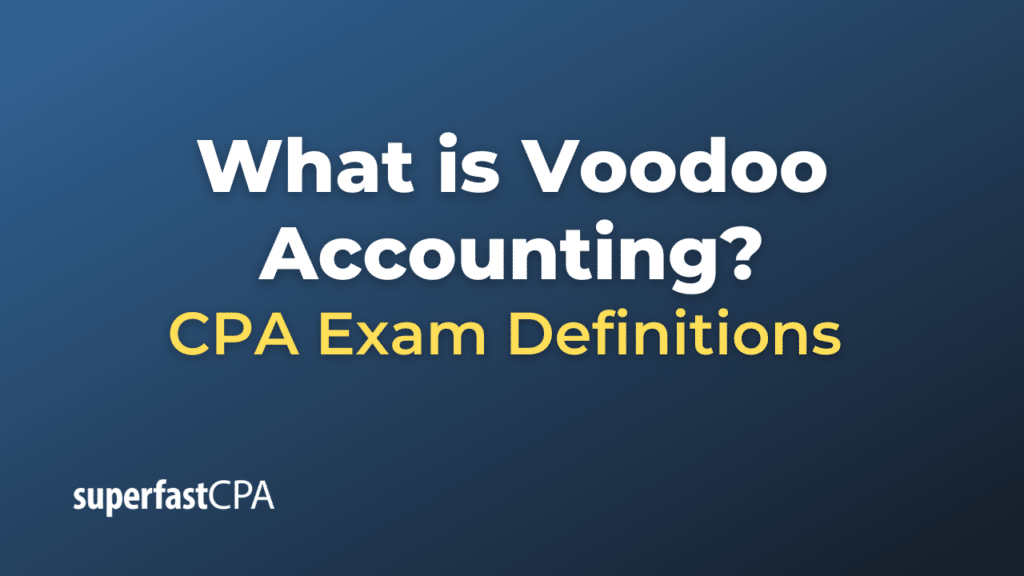Voodoo Accounting
“Voodoo Accounting” is a colloquial term used to describe questionable or unethical accounting practices that are designed to intentionally misrepresent a company’s financial condition. This term is often used pejoratively to criticize accounting methods that are considered manipulative, misleading, or fraudulent. While not a technical or formal accounting term, “Voodoo Accounting” is meant to evoke the idea that like voodoo magic, these accounting practices involve trickery or illusion.
Such practices may include:
- Revenue Recognition: Inflating revenue by booking sales that haven’t occurred yet or are conditional.
- Expense Manipulation: Delaying the recording of expenses to show higher short-term profits.
- Off-balance Financing: Hiding liabilities or losses in a way that they do not appear on the balance sheet.
- Related-party Transactions : Engaging in transactions between entities that have relationships with each other, often to shift profits or losses in a misleading way.
- Asset Valuation: Overstating the value of assets to make the company look more financially robust than it actually is.
- Provisions and Reserves: Creating excessively large or small provisions or reserves to smooth out profits over several years, making the company appear more stable and less risky to investors.
- Complex Structures: Using overly complicated corporate structures and financial instruments to obscure the true financial condition of the company.
Example of Voodoo Accounting
Let’s consider a hypothetical example of a company named “BrightTech” to illustrate how “Voodoo Accounting” practices might be applied.
The Scenario:
BrightTech is a tech startup that specializes in developing solar-powered devices. The company has been underperforming, and there’s immense pressure from investors for it to turn a profit this quarter. To meet investor expectations, the CFO decides to engage in questionable accounting practices.
Voodoo Accounting Techniques Used:
- Revenue Recognition: BrightTech has negotiated a contract worth $1 million with a new client. However, the contract states that the payment will be made only after all devices are successfully installed and tested. Ignoring this condition, BrightTech records the $1 million as revenue for the current quarter to boost its earnings.
- Expense Manipulation: The company has spent $200,000 on marketing in the current quarter. However, the CFO decides to record only $50,000 as marketing expense and defers the rest as a “prepaid expense,” arguing that the marketing will benefit future quarters as well.
- Off-Balance Financing : BrightTech sets up a special purpose entity (SPE) to take out a loan of $500,000 for a new project. This SPE is not reported in BrightTech’s balance sheet, making the company’s debt levels appear healthier than they actually are.
- Asset Valuation : The company owns some intellectual property (IP) which it had earlier valued at $300,000. The market for this type of IP has declined, but BrightTech does not write down its value, keeping it at the original $300,000 valuation.
Outcome:
On paper, BrightTech’s financials now look excellent:
- Revenue is reported at $1 million higher than it should be.
- Expenses are recorded as $150,000 less than they actually are.
- Liabilities are understated by $500,000 due to off-balance-sheet financing.
- Assets are overstated by keeping an inflated IP valuation.
The quarterly report shows a profit, and initially, the stock price rises. Investors are pleased, and everything seems to be going well.
The Fallout:
However, auditors eventually catch these discrepancies during their annual audit. They flag the revenue recognition, the deferred expenses, the off-balance-sheet financing, and the inflated asset valuation. News leaks, and an investigation is launched into BrightTech’s financial practices.
- The stock price plummets.
- Investors lose confidence in the company.
- Legal penalties are imposed.
- The CFO is fired, and the company’s reputation takes a massive hit.
The consequences are severe, not just in financial terms but also in loss of credibility and legal repercussions.
This hypothetical example illustrates how “Voodoo Accounting” can artificially inflate a company’s financial performance in the short term but carries significant risks and consequences. These manipulative practices are not only unethical but often illegal, and they can lead to severe ramifications for the company and its executives.













